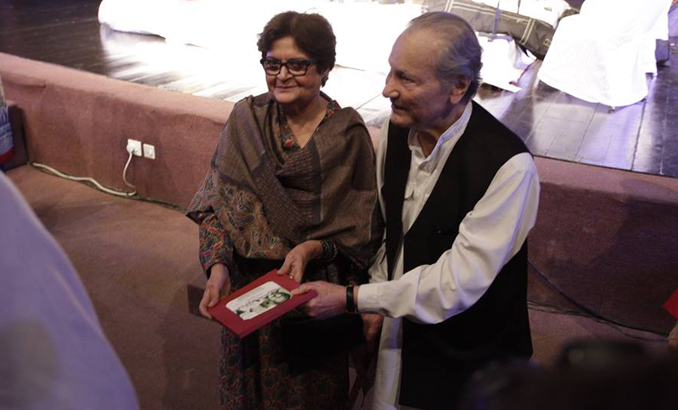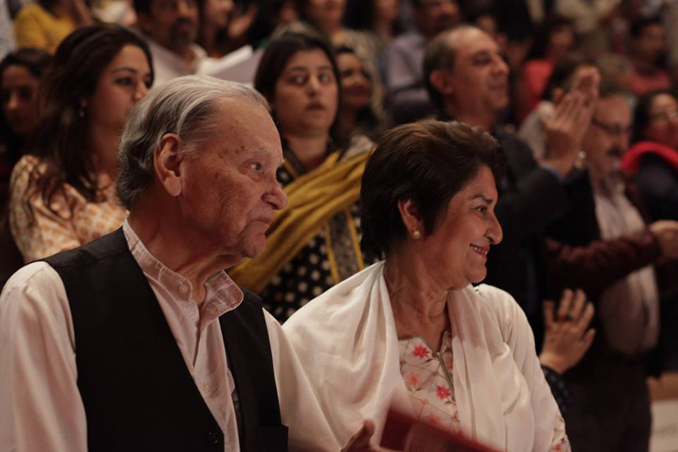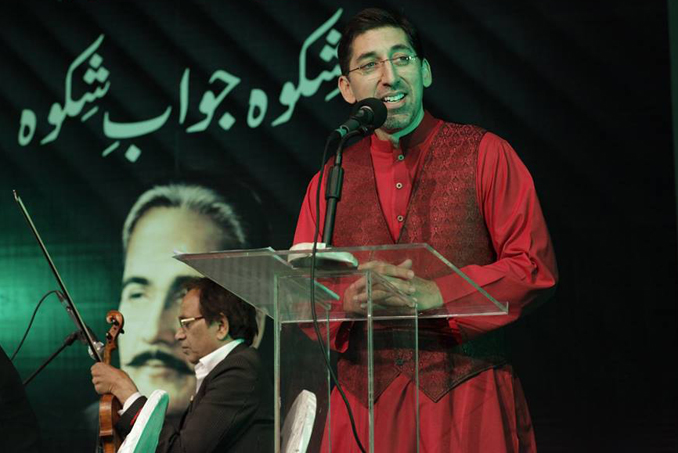Written by: Salma Chaudhry - Posted on: December 05, 2014 |  Comments
Comments
Google Translation: اُردو | 中文
It was in 1909 that Allama Muhammad Iqbal recited ‘Shikwa’ (‘The Complaint’) in Lahore, at a small gathering of Anjuman-i-Himayat-i-Islam. The event produced a stir, and Shikwa remains Iqbal’s most contentious poem to date, with several admirers, of course, but many critics as well. Although no one could really question the poetic qualities of the poem, many orthodox Muslims had reservations about its message. The main theme of Shikwa is Iqbal’s complaint to God about the downfall of Muslims and the oppression faced by them. Many Muslims accused Shikwa of being disrespectful, especially due to the use of words like harjaee (‘disloyal’) for God. Iqbal was well-aware of the charges against him, which eventually led to another composition in 1913, titled Jawab-e-Shikwa (‘Answer to the Complaint’).
 |
Salima Hashmi (daughter of Faiz Ahmed Faiz) with Javed Iqbal (son of Allama Iqbal) |
Shikwa was composed at a critical time, when Muslims in India had nearly lost their identity. The heartrending circumstances and deprivation faced by Muslims had a profound effect on Iqbal. In Shikwa, Iqbal complains about the fact that non-Muslims enjoy the bounties of Allah while Muslims suffer all over the world. He further talks about the old ardor that could to be reawakened, but only with Allah’s mercy. Shikwa is a remarkable composition, consisting of 31 stanzas with 6 verses each. It highlights Islamic traditions and values in a beautiful manner, touching even the hardest of hearts. Upon the release of Shikwa, an oppressed nation’s passion was ignited with a wave of enthusiasm. When Iqbal wrote it, orthodox ulema called him a kafir (‘infidel’); but it was only until the composition of the Jawab-e-Shikwa in 1913, that the same Iqbal became a mujtahid (‘religious authority’) in the eyes of the same ‘scholars’.
Jawab-e-Shikwa is an answer to the complaint, where Iqbal beautifully uses his lyrical expression to explain how Allah would have responded. The poem was recited by Iqbal at Mochi Gate in 1913 at a fundraising event to help the Turks fight the Bulgarians. Money collected from selling copies of the poem was forwarded to Constantinople. In Jawab-e-Shikwa, Iqbal ingeniously responds to all criticisms made against Shikwa by explaining that it was a call to him from God. Jawab-e-Shikwa was a powerful, commanding, and highly successful endeavor to make Muslims aware of their own shortcomings.
 |
Mr. and Mrs. Javed Iqbal |
Faiz Ghar, in collaboration with the Alhamra Arts Council, celebrated the birth anniversary of Iqbal on 9th November, 2014. The evening was dedicated to Iqbal’s ‘Shikwa’ and ‘Jawab-e-Shikwa’. Renowned writers, poets and artists graced the event with their presence, including Allama Iqbal’s son, Javed Iqbal, who lauded the efforts of Faiz Ghar and urged the younger generation to follow Iqbal’s message. “We should not be celebrating Iqbal’s urs; rather, his message should be read and followed by every Pakistani, young and old ’, he said.
Tina Sani kicked off the night’s performances with Rumi’s kalam. Audiences had been looking forward to her performance, and she certainly did not disappoint. Her reading of Rumi’s ‘Nawa-e-Ney’ received a round of applause from the crowd. Miss Sani’s voice, fused with the rhythms of the flute and harmonium, left the audience mesmerized as she read the first stanza of Shikwa, while actor Adeel Hashmi read the Jawab-e-Shikwa. Both performances kept the audience enthralled.
 |
Adeel Hashmi reading the Jawab-e-shikwa |
The evening ended with Tina Sani’s brilliant vocals doing complete justice to Iqbal’s ‘Her Lehza Hai Momin.’ An audio book of Iqbal’s Payam-e-Mashriq was also launched and made available at the stalls inside the hall. It was an evening well-spent, with poignant music having a soothing flow of essence that left the listeners absolutely fascinated; but more than anything else, it was really Iqbal’s message that touched the souls of all present.
All pictures provided by Faiz Ghar